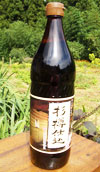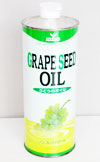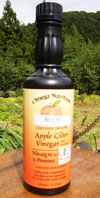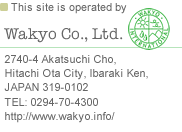|
However hard you try to be careful, if the flavourings and seasonings that you put a little of in your mouth every day are inferior products made from food additives it will be hard to maintain real health and beauty.
Let me tell you here about the inferior flavourings instantly produced in large-scale factories that you find in your supermarkets and, in contrast, flavourings recommended for vegetarians.
|
Miso
 |
There is a great difference between natural miso and mass-produced miso.
Much of the miso sold in supermarkets and so on is produced from the soy cake remaining after the oil has been extracted with the chemical agent n-hexane. Sorbic acid or potassium sorbate are used as preservatives to prevent the soy cake from spoiling, and then to improve the taste chemical flavourings and other food additives are included in large amounts.
Whereas miso should really be slowly and naturally fermented over a period of a least six months, the factory-made miso is a fake product that is made instantly in a short period of time.
|
Soy sauce
 |
The reality of factory mass-produced soy sauce is that it is made in a very short time, when it should really be matured for at least a year, by mixing various materials such as imported soy cake (the dregs remaining after the soy oil has been extracted with n-hexane), wheat gluten, fish cake, hair and so on, to which common salt, sweeteners, preservatives, chemical flavourings and so on are added.
Products such as "salt-reduced soy sauce" and so on have a strongly toxic acidulant added instead of the salt to deceive the taste buds and also use additives such as preservatives.
|
Edible oil
 |
The general edible oils mass produced in factories are palm, soy, rapeseed (canola), corn (maize), and so on. These oils are extracted using the toxic petrochemical hexane as extracting solvent. (Some of the raw material crops may be GM crops.)
In addition, although often not mentioned as additives, in the process of producing the oil, powerful chemical agents such as sulphuric acid, hydrochloric acid, oxalic acid, and caustic soda are used.
You should also be careful when buying edible oil as strongly toxic additives are sometimes used as antioxidants.
|
Vinegar
 |
There are big differences between real, natural vinegar and synthetic or alcohol vinegar. Synthetic vinegar is made by cracking petroleum to obtain ethylene, making glacial acetic acid from the ethylene and then diluting that with water and adding additives.
Glacial acetic acid is 99% acetic acid, which is a chemical mineral.
The most commonly produced brewed vinegar is made from potato starch and honey, or spent sulphite pulp liquor, and quickly transformed into vinegar. These are all flavourings with strong stimulating effects on the body.
|
References
"You should know this - bad foods, good foods"
"You should know this - 1000 scary foods"
"You should know this - more 1000 scary foods"
Published by Nashonaru Publishers
These are delicious and good for you!
|
Flavourings recommended for vegan-vegetarians
|
|
Safe
|
Delicious!!
|
Superior Quality
|
Organic genmai fresh miso (spicy), awase (mixed) fresh miso (non-spicy)
 |
Organic genmai fresh miso is made from organic rice and soybeans using a traditional production method of seasoning the miso in cedar tubs for over a year and is a fresh miso with a good yeasty flavour.
The awase fresh miso is made from organic domestic (Japanese) barley, brewed slowly and naturally. A fresh miso with a fresh-from-the-brewery taste and a good yeasty flavour from non-heat treated yeast.
|
Soy sauce seasoned in cedar vats
 |
Made from domestic (Japanese) round soybeans, domestic wheat and solar salt, a soy sauce brewed using traditional methods for the connoisseur.
Seasoned for a long period in cedar vats, a wonderful soy sauce with a rich, full bouquet and deep flavour.
|
Grape seed oil
 |
A top-grade oil made in France by crushing grape seeds (first crushing).
Cholesterol-zero and, of course, no additives. This is a healthy oil with the highest level of polyphenols.
As it is virtually tasteless and odourless, and thus has no aftertaste, it is a multipurpose oil that can be used for a variety of cooking and in cake-making and so on.
Used for deep frying, this oil gives a clean feel and aftertaste and does not "sit" heavily on the stomach.
|
Organic apple vinegar
 |
Hand-picked from the tree to ensure that the apple does not come into contact with soil bacteria, these pesticide-free apples are naturally fermented to give fresh apple vinegar that contains no chemical substances or additives, preservatives, or even water, and so on. |
|
|
|












![Vegetarian Recipes [Japanese]](../images/contents01_a.gif)

![Vegetarian Recipes [Chinese]](../images/contents01_b.gif)

![Vegetarian Recipes [European ,etc]](../images/contents01_c.gif)

![Vegetarian Recipes [Sweets]](../images/contents01_d.gif)























![Vegetus Shop [Japanese]](../images/vegetesu_shop.jpg)

![Wakyo Co.,Ltd. [Japanese]](../images/wakyo.jpg)

![Vegetarian Therapy [Japanese]](../images/vegeterian_therapy.jpg)






















